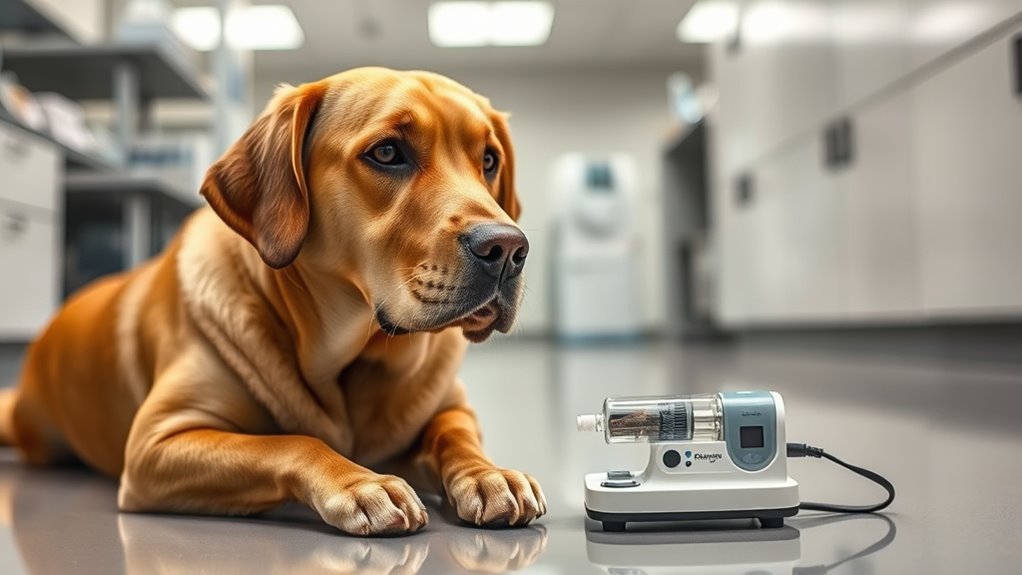Dogs can detect Parkinson’s disease before symptoms show up by sensing specific chemical changes in bodily scents linked to the disease’s genetic markers. Their highly developed sense of smell allows them to identify unique biochemical signatures in sweat, urine, or skin that humans can’t detect. This early detection can prompt further tests and lead to earlier intervention. If you keep exploring, you’ll discover how this innovative method could transform early diagnosis.
Key Takeaways
- Dogs can detect biochemical signatures linked to Parkinson’s disease before physical symptoms manifest.
- They are trained to recognize specific scent alterations in bodily excretions associated with genetic markers.
- Early detection by dogs offers a non-invasive, rapid screening method for at-risk individuals.
- Their olfactory abilities enable identification of preclinical disease markers, supporting earlier medical intervention.
- This detection method complements traditional tests, potentially improving early diagnosis accuracy.

Dogs have an incredible sense of smell that allows them to detect Parkinson’s disease even before symptoms appear. This remarkable ability is rooted in their highly developed olfactory system, which is capable of identifying specific chemical changes associated with the disease. Researchers have found that dogs can recognize subtle scent alterations linked to genetic markers that signal an increased risk for Parkinson’s. These genetic markers, present long before physical symptoms manifest, produce distinct biochemical signatures in a person’s sweat, urine, or skin. By training dogs to identify these markers, medical professionals hope to facilitate early intervention, potentially slowing disease progression or improving management.
When you consider early detection, the importance becomes clear. Since Parkinson’s symptoms often develop gradually and can be mistaken for normal aging, many patients face delays in diagnosis. Dogs trained to detect these preclinical markers could change that landscape, offering a non-invasive and rapid screening tool. You might find that a dog’s alertness to specific scents could prompt further medical testing, such as imaging or biomarker analysis, to confirm the presence of Parkinson’s before motor symptoms interfere with daily life. This early warning system could allow for treatments to start sooner, possibly preserving motor function and reducing long-term disability.
The process of training dogs to detect Parkinson’s involves exposing them to scent samples from individuals with known genetic markers associated with the disease. These samples contain chemical signals that are often imperceptible to humans but stand out to a dog’s sensitive nose. Over time, dogs learn to associate these unique scents with the presence of the disease, and their reactions become consistent indicators. As a result, they can be deployed in clinical settings or at-risk populations to identify potential cases that might otherwise go unnoticed until symptoms become severe. Understanding the vetted detection methods used in this process ensures accuracy and reliability in early diagnosis efforts.
Frequently Asked Questions
Can Dogs Be Trained to Detect Other Neurological Diseases?
You might wonder if dogs can be trained to detect other neurological diseases. With detection training and scent analysis, dogs can potentially identify various conditions by recognizing unique odor signatures. Their incredible noses allow them to pick up on subtle chemical changes. Researchers are exploring this possibility, so you could see dogs aiding in early diagnosis of diseases like Alzheimer’s or multiple sclerosis, greatly improving patient outcomes through scent-based detection.
How Accurate Are Dogs at Early Parkinson’S Detection?
You might wonder how accurate dogs are at early Parkinson’s detection. Their remarkable smell sensitivity allows them to identify subtle chemical changes in your body before symptoms show. Studies report detection accuracy rates often exceeding 90%, showcasing their incredible ability. Their keen noses enable them to pick up on these early indicators, making them valuable partners in early diagnosis efforts.
What Specific Scents Do Dogs Identify in Parkinson’S Detection?
Imagine uncovering a secret scent only your dog can detect. In Parkinson’s detection, dogs identify unique olfactory markers—specific scent biomarkers linked to the disease. These scent biomarkers are subtle chemical changes in a person’s odor that reveal early signs of Parkinson’s. By honing in on these elusive olfactory markers, dogs can alert you to the disease long before symptoms emerge, offering hope and a new frontier in early diagnosis.
Are There Any Risks for Dogs Involved in This Detection Process?
When considering risks for dogs involved in detection, you should prioritize their health and training safety. While dogs are generally safe, overexposure to samples or improper handling can cause stress or health issues. Guarantee their training is gradual and supervised, and monitor their well-being closely. Maintaining good conditions and respecting their limits helps prevent potential risks, affirming that dogs stay healthy and effective in their essential detection roles.
How Soon Can Detection Dogs Be Integrated Into Regular Medical Screenings?
You might wonder how soon detection dogs can be part of regular medical screenings. It depends on the screening implementation and training timeline. Once the dogs are properly trained, which can take several months, they can be integrated into screening programs. With ongoing research, this process could become quicker, making early detection more accessible. Ultimately, the timeline hinges on training efficiency and clinical validation to guarantee reliable results.
Conclusion
You might be surprised to learn that dogs can detect Parkinson’s up to two years before symptoms show, giving you valuable early warning. Imagine the impact this could have on treatment and quality of life. With their incredible noses, dogs are proving to be more than just loyal companions—they’re becoming essential partners in early diagnosis. This breakthrough highlights the amazing bond between humans and dogs, offering hope for better outcomes through their extraordinary sense of smell.









